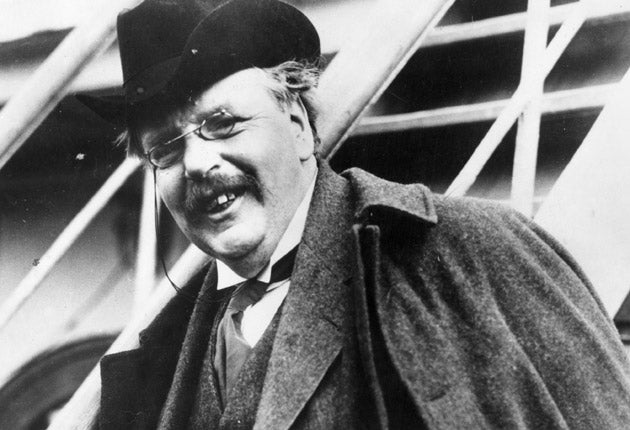G K Chesterton: A Biography, By Ian Ker
A voyage around GK's Father is only half the story

Remembered mostly today for a much anthologised poem about the Palm Sunday donkey ("When fishes flew and forests walked...), the congenial Father Brown detective stories and two and a bit pages of aphorisms and paradoxes in the latest Oxford Dictionary of Quotations, G K Chesterton (1874-1936) was overdue a comprehensive account of his many other achievements.
And Ian Ker's 729-page life is certainly not short on detail.
The lanky, six-foot Chesterton didn't much distinguish himself in his youth. He did, however, make a lifelong friend of Edmund Clerihew Bentley, letters to whom – and to many others – provide Ker with evidence and source material. Chesterton failed at art school before going to Cambridge, where a chance meeting with a member of the publishing family Hodder led to a lifelong career as an author and journalist.
Many books of art and literary criticism were to follow. Ker writes that Chesterton's Charles Dickens is "one of the classics of English literary criticism and... widely considered the best criticism of Dickens ever written". But it was journalism that was to keep Chesterton and his wife, Frances, comfortably, in spacious homes in Beaconsfield where they entertained the big literary names of the day: G B Shaw, H G Wells, Hilaire Belloc. Chesterton took over the famous Our Notebook column in Illustrated London News in 1905. Fame followed. There were also novels, of which the best was The Man Who Was Thursday (1908). Father Brown, an unassuming East Anglian Roman Catholic priest inspired by Chesterton's friend John O'Connor, first appeared three years later.
Ker, who has written extensively about Cardinal John Henry Newman, is especially good on Chesterton's journey to Catholicism. Always a religious man, who argued that culture is inextricably linked to religion, he was gradually drawn to Catholicism, before converting in 1922.
What makes Chesterton so engaging, nearly 80 years after his death, is the likeable decency which shines through almost everything he wrote. Accused in his early days of frivolity and flippancy, he maintained that "the comic is not the opposite of the serious". He was liberal in politics and outlook, although he became disillusioned with the Liberal Party after the 1912 Marconi affair – an insider dealing scandal involving several government ministers.
He and Frances, who managed his untidy absent-mindedness with aplomb, were childless, which was a joint sadness. Instead, Chesterton became a clumsy, obese but rapier-minded "uncle" to many visiting children. Only once was he heard to lose his temper with a child. Chesterton asked a little girl to apologise to a servant to whom she had been rude. When she replied "Why should I? She's only a servant", Chesterton angrily sent her to her room.
In places, Ker's book made me laugh aloud. In the second half of his life, for example, Chesterton travelled quite extensively, and when a visa application form asked "Are you in favour of subverting the government of the United States by force?", he wanted to write: "I prefer to answer that question at the end of my tour rather than the beginning." What entertaining company he must have been.
This masterly biography also has the potential to help establish Chesterton in what Ker regards as his rightful place as a major English author.
Join our commenting forum
Join thought-provoking conversations, follow other Independent readers and see their replies
Comments